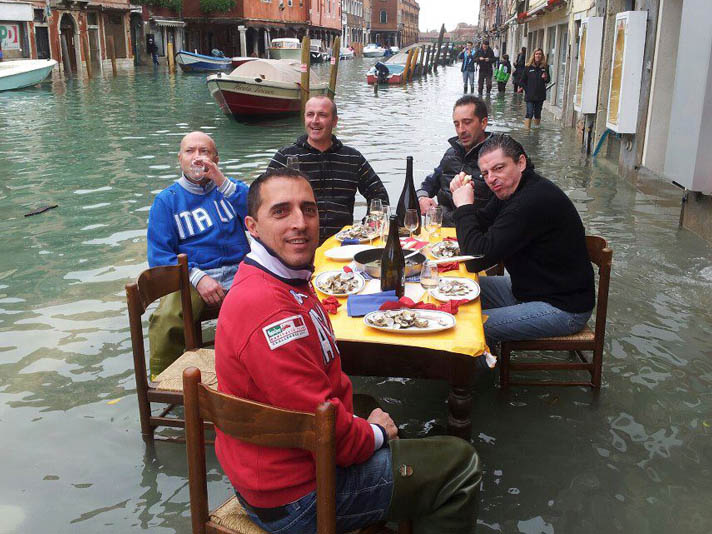
Sono felice di farvi conoscere il mio amico Diego Cattaneo, il direttore di Venice Italian School. Diego è nato a Venezia, si è laureato a Bologna, e insegna italiano da 2000. Lui è così appassionato d’insegnare la lingua come io sono appassionata d’impararla. Come risultato abbiamo deciso di riunirci per appoggiare e promuovere la apprendimento della lingua nella città della sua nascità – Venezia. In aprile 2013 per dieci giorni facciamo un’esperienze di Language & Culture immersione in cui studenti e coloro che sono affascinati di Venezia possono partecipare. Nel primo guest blog di Diego, ci racconta l’orgoglio di una nuova generazione di Veneziani e ci spiega la situazione attuale a Venezia.
I am happy to introduce to you my friend Diego Cattaneo, the director of Venice Italian School. Diego was born in Venice, he graduated from Bologna and has been teaching Italian since 2000. He is as passionate about teaching the language, as I am about learning it. As a result, we decided to join forces to support and promote the idea of learning Italian in his city of birth – Venice. In April 2013, for 10 days we will share a language and cultural immersion experience in which students of the language and those who are intrigued with the city can participate. In his first guest blog, Diego tells us about the pride a new generation of Venetians and explains the current situation in Venice.
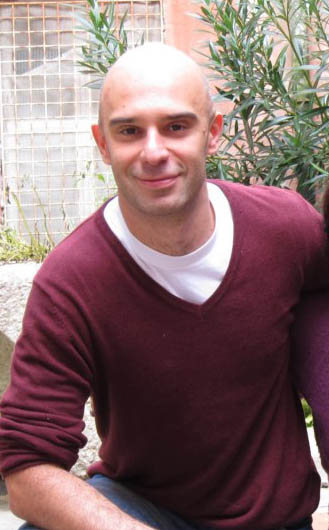
Venezia sott’acqua? San Marco come una grande piscina, dove i turisti si divertono a fare il bagno in Novembre? O ancora: Venezia che affonda, che sprofonda e che aspetta rassegnata uno tsunami adriatico?
Venezia underwater? San Marco, a big swimming pool, where tourists amuse themselves by taking a swim in November? Or still: Venezia is sinking, sinking, and just waiting for an Adriatic tsunami to finish her off?
Io, da veneziano, penso che i media internazionali siano un pò troppo “apocalittici”. L’alta marea NON sommergerà Venezia e Venezia NON sta affondando. Certo: l’acqua alta è un problema molto serio. Ricordo tanti anni fa, quando le “sirene” suonavano forti nel cuore della notte; erano ancora quelle usate durante la Seconda Guerra Mondiale: che paura per un bambino nel buio della notte!
I, as a Venetian, think that the international media are a little too “apocalyptic”. The high tides are not going to submerge Venice and Venice is not sinking. Certainly, the acqua alta (high water) is a very serious problem. I remember years ago when the “sirens” sounded in the middle of the night; they were the ones used during the Second World War; what fear for a child to waken to this alarm in the dead of night.
E ricordo la stanchezza e la frustrazione di mio padre: con due negozi di abbigliamento a rischio, per lui la giornata cominciava con quella sveglia inusuale. E via, di corsa, a montare le barriere sulla porta di casa, prima; e poi ancora, sempre di corsa, a salvare la merce del negozio, alzandola di un metro e mezzo da terra. E poi lì, ad aspettare che la marea passi (6 ore sù, 6 ore giù) per dopo pulire, sciaquare e rimettere in ordine la roba…e cominciare la “normale” giornata lavorativa. Una faticaccia!
And I remember the fatigue and the frustration of my father, a merchant with two clothing stores at risk, how he had to begin his day, to the sound of that alarm. First, he was off and running to place the barriers at the front doors of the house and then on to the stores to save the store’s merchandise, elevating all the merchandise five feet from the ground. And then there was the waiting there for the tide to pass (six hours up, six hours down) in order to clean, rinse and put everything back in place. At that point, and only then could he begin a “normal” workday. What a hassle!
Eppure, nonostante quello che dicono i media, Venezia NON è una seconda Atlantide in attesa di essere sommersa! L’acqua alta arriva in un periodo limitato dell’anno (l’inverno, fra Novembre e Febbraio); colpisce soprattutto alcune zone “basse” della città (in primis, la famosa Piazza San Marco) e chi vive o lavora al pianoterra.
Yet, despite what the media says, Venice is NOT a second Atlantis waiting to be submerged! L’acqua alta comes during a short period of the year — usually between November and February — and mainly affects some of the low-lying areas of the city (primarily the famous Piazza San Marco) and those who live or work on the ground floor of buildings in those areas.
Eppure, l’acqua alta NON è il problema principale della città in questi ultimi anni.
However, the high water is NOT the main
problem of the city in recent years.
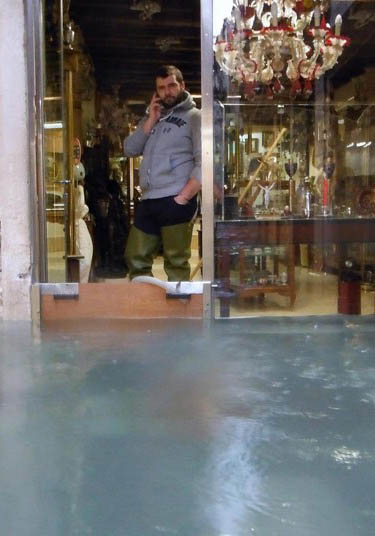
Quello che veramente preoccupa i veneziani non è tanto l’alta marea quanto la bassa popolazione. Cosa significa? Significa che la popolazione di Venezia, negli ultimi 30 anni è diminuita di circa 25.000 residenti. E il numero delle persone che lasciano la città continua a crescere.
What really worries the Venetians is not so much the high tide but rather, the low population. What does this mean? It means that the population of Venice in the last 30 years has decreased by 25,000 residents and the number of people leaving the city continues to increase.
Il problema non è dunque il sinking (affondamento) quanto lo shrinking (spopolamento).
The problem is not sinking, but rather the shrinking of the population.
Perchè i veneziani lasciano la loro bellissima città? Ci sono alcune cause oggettive, altre più soggettive. Fra le prime: “Venezia è cara, anzi carissima”! Il costo di una casa è fuori portata della grande maggioranza dei giovani – chi resta, ha avuto la fortuna di avere una casa in eredità dai nonni o comprata dai genitori.
Why are Venetians leaving their beautiful city? There are some several factors. Among the first: “Venice is an expensive city in which to live”. The cost to buy a home is out of reach for a vast number of young people and those who remain have been lucky enough to have a house they have inherited from grandparents or bought by parents.

Fra le seconde, molti dicono, “Venezia è scomoda”: non c’è la macchina, bisogna sempre camminare, anche con le sacche della spesa. “Venezia è turistica” – turisti dappertutto, tanti negozi di maschere e souvenirs…ma io dove vado a comprare il latte? Tutto vero, in generale.
Other reason people are leaving the city is that many say “Venezia is uncomfortable” there are no cars and you have to walk everywhere, even with shopping bags. “Venezia is too touristy” There are too many tourists about and there are mask and souvenir shops everywhere. “Where can one go to buy a regular old carton of milk? In general, it is all true.
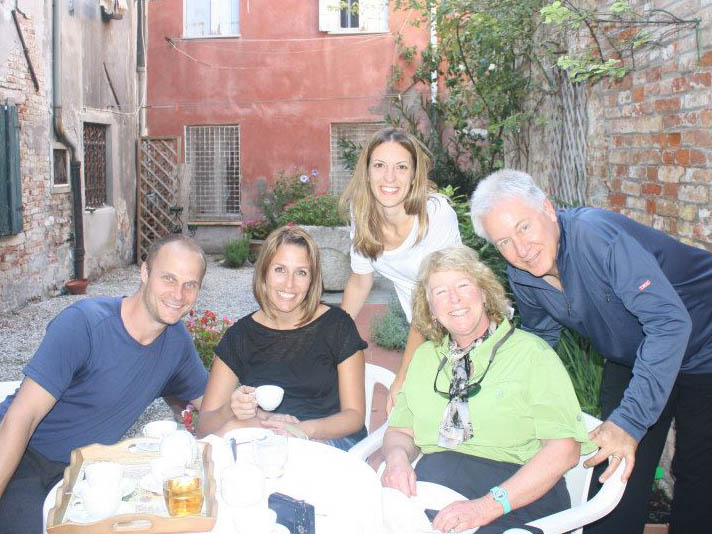
Eppure…eppure c’è una Venezia che resiste: ci sono giovani imprenditori e artigiani veneziani che non abbandonano la loro città; che si ostinano a vivere a Venezia, nonostante tutte le difficoltà. Veneziani che lavorano e che vogliono innovare la città e la sua immagine, cercando al contempo di mantenere in vita le secolari tradizioni e la ricca cultura veneziana.
And yet…and yet there is a new generation of Venetians that is resisting all this. They are the young entrepreneurs and Venetian artisans who are not abandoning their city but choosing instead to stay, live and work in Venice despite all these difficulties. This is a new generation who want to work to innovate the city and renew its image, while at the same time keeping alive the old traditions and the rich Venetian culture.
Alberto, che ha deciso di insegnare come vogare “alla veneta” ai nuovi residenti della città, inclusi i nostri studenti. Stefano, che organizza giri in bicicletta al Lido; e poi Diego e Lucia (!) che hanno deciso di aprire la Venice Italian School per insegnare l’italiano provando – al tempo stesso – ad avvicinare i loro studenti alla Venezia più “vera”, con la sua lingua, i suoi cibi, i suoi vini e le sue tradizioni.
Alberto decided to stay to teach the craft of Venetian rowing to new residents of the city, including our students. There is also Stephen, who organizes bicycle tours in the Lido and then, of course, myself along with my sister Lucia, who together have opened the Venice Italian School to teach Italy, with the profound desire to introduce to students the real Venice, its language, food, wines, and traditions.
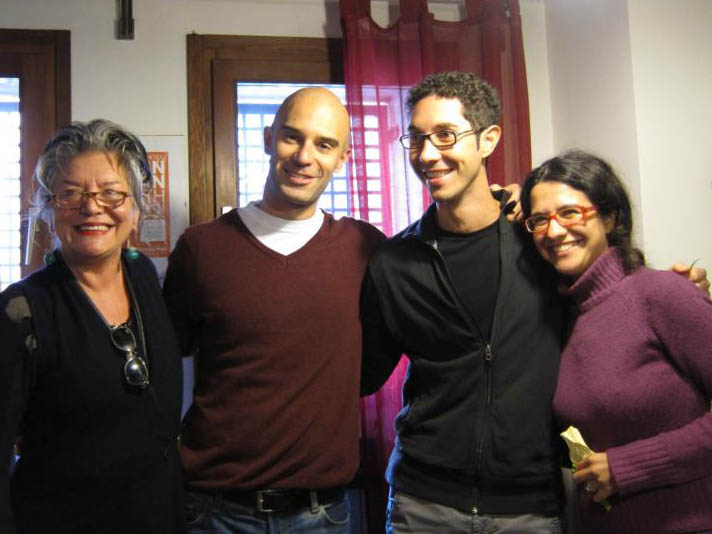

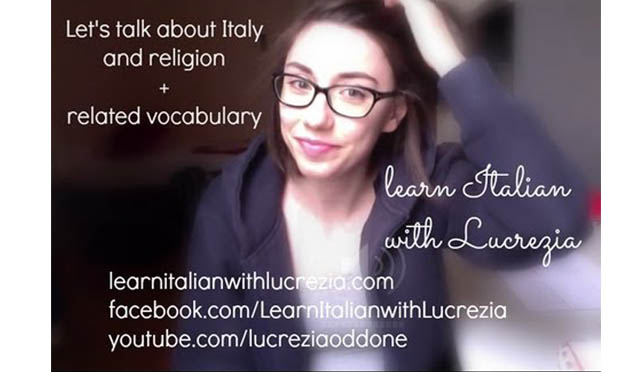
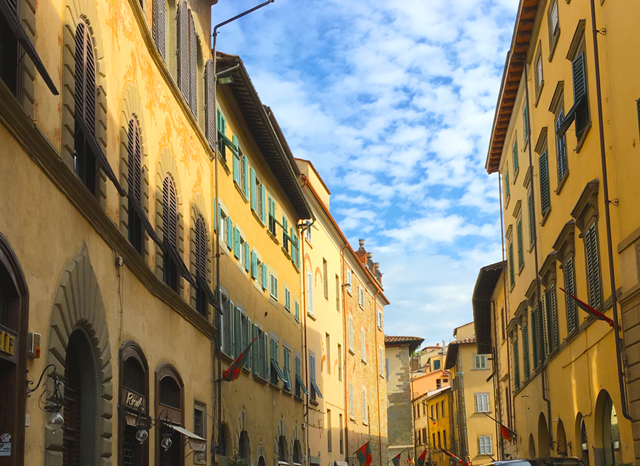
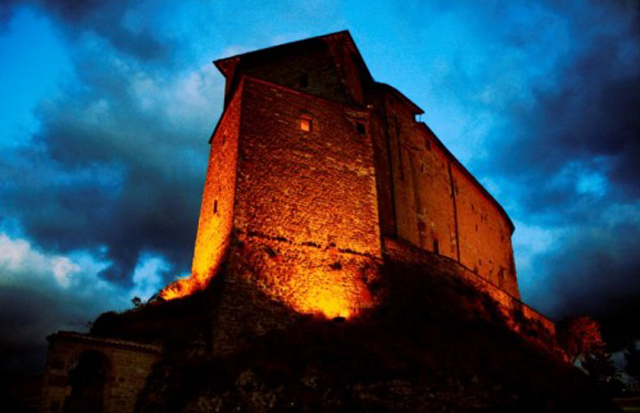

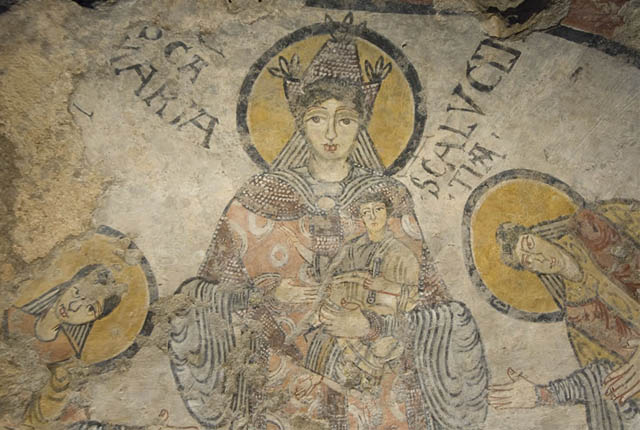






Non posso non segnalare questo pezzo dedicato a Venezia.
http://radiocole.blogspot.it/2012/11/la-nascita-di-una-dea.html
Ovviamente ora segnalerò questo di là… scusate l’incrocio, ma era cosa praticamente obbligata stavolta.
Almeno secondo me.
Grazie per questo segnalazione Mara! Jane ha scritto un bellissimo lettera d’amore a Venezia! <3
Grazie a Rabb-it sono passata a dare un’occhiata a questo blog, in generale, e a questo post, in particolare.
Wow!
Se non fossi italiana correrei subito ad imparare l’italiano a Venezia.
Bella iniziativa, complimenti!